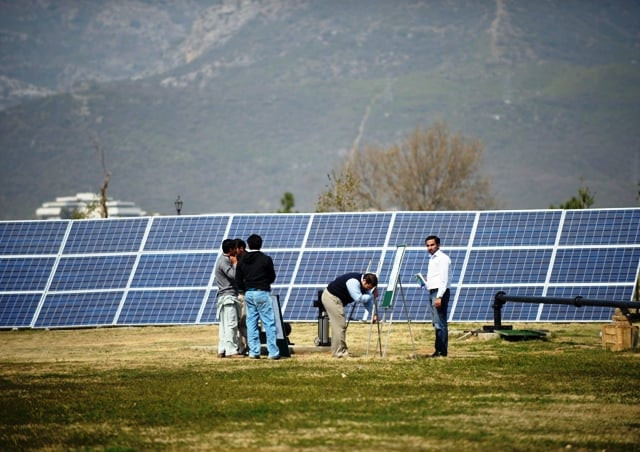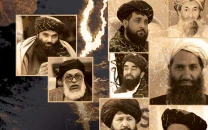Sindh plans solar energy for rural areas
Project aims to achieve economic development through use of domestic renewable resources

Representational image of solar panels being installed. PHOTO: AFP
RO plants to run on solar power
Speaking at a seminar on Sindh Solar Energy Programme (SSEP) - deployment of Solar Home Systems (SHS) in the rural off-grid areas of the province, he said that although energy was a basic need for socio-economic development in this modern era, a sizeable population still did not have access to electricity. "It is the aim of our government to make affordable electricity accessible to all," he said, adding the proposed project was the first step towards achieving this objective. The consultative workshop with all stakeholders was a key event for successful implementation of the project on sustainable grounds, he said.
The seminar, organised by the Energy Department at a local hotel, was attended by Country Director World Bank Illango, P&D Chairman Mohammad Waseem, Principal Secretary Sajid Jamal Abro, provincial secretaries, energy experts and investors.
"Sindh is suitably placed to access and utilise donor financing options to scale-up solar energy, thus mitigating the energy shortage being faced by the province. Sindh has sufficient solar and wind power potential," he said.
Shah said that Sindh has relatively low level of electrification, especially in remote areas. "These localities will have electricity access by using solar PV under this program," he said, adding, "this is also an opportunity for Sindh to enhance economic development through the use of domestic renewable resources, and gain familiarity with solar technology and its operation," he said.
Sindh plans to light 20,000 households with solar energy
Talking about wind energy, Shah said that with its abundant wind source, Sindh can play a leadership role in demonstrating conjunctive use of solar and wind power in a manner that optimises the use of evacuation infrastructure.
He said that this pragmatic approach would look into the viability of solar energy at different scales - rural off-grid, urban rooftop and utility scale solar. "It is now a proven fact that solar energy is not only technically feasible, but cost-effective too," he said and added that the recommendations of this consultative workshop for a new solar strategy would move the nation towards greater energy access and security.
Shah recalled that the idea to analyse where we stand today and where our tremendous opportunities lie originated during his meeting with the World Bank President last year in Karachi. "Sustainable energy for all is our mission and we want every single home equipped with affordable electricity in the province," he said and added, "though ambitious, this is going to be a bold initiative. He hoped that our experts would find pragmatic solutions during this workshop to ensure energy access for all."
The provincial minister for energy, lmtiaz Shaikh, said that energy was the life line of the economy and has a direct impact on socio-economic development. He added that the `Sustainable Energy for All' was one of the top most global agenda of the UN to combat poverty, terrorism and other social evils from society. The Energy Department with a proactive approach in line with Sustainable Development Goals was expected to contribute a sizeable share in the development and progress of the country, he added.
He said that the development of wind corridors at Jhimpir and Gharo were in full swing. "Some 20 projects are producing above 1 gigawatt electricity from wind and many more projects are at various development stages," he said and added the province took the lead in establishing its own power transmission and dispatch company STDC which was successfully managing transmission lines from Nooriabad to Karachi.
Shaikh said that the SSEP Programme was mainly focused to divert the conventional methods of energy production to state-of-the-art new solar technologies to achieve the target of 100% electricity access to all.
Published in The Express Tribune, October 4th, 2018.


















COMMENTS
Comments are moderated and generally will be posted if they are on-topic and not abusive.
For more information, please see our Comments FAQ